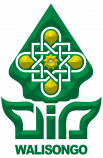Universitas Islam Negeri Walisongo Semarang - Indonesia
Athar IstÄ«Ê¿ÄÂb al-MufradÄÂt wa-al-QawÄÂÊ¿id Ê¿alá KafÄÂ’at al-KitÄÂbah al-ImlÄÂ’īyah li-al-TalÄÂmÄ«dh fÄ« al-Faá¹£l al-ThÄÂmin bi-Madrasat Al-Waá¹ÂanÄ«yah al-ThÄÂnawÄ«yah al-IslÄÂmÄ«yah Kebumen
Many students at Wathoniyah Islamiyah Junior High School (Madrasah Tsanawiyah) Kebumen graduated from public elementary schools, so many had not have adequate knowledge of the Arabic language. This study is essential because students' diverse vocabulary and grammatical comprehension influenced their writing and spelling ability. The current study investigates the influence of vocabulary and grammatical comprehension on eighth grade students' spelling writing abilities at Wathoniyah Islamiyah Kebumen. All eighth-grade students at Wathoniyah Islamiyah Junior High School were recruited in this research. The study employed a quantitative design and purposive sampling technique to test the sample. The researchers obtained the data using documentation and analyzed the data using multiple regression tests. The results indicated that the F value is 11.250, and the F table with the value from the table at a 5% significance level = 3.385. Therefore, the F count exceeds the F table. The findings also indicated that the students' vocabulary and grammatical knowledge and comprehension have a substantial influence on their spelling and writing skill. Therefore, the research hypothesis is acceptable.
Keywords: Vocabulary; Grammar; Writing; Spelling writing ability
- Al-Nemari, Hanan S. TadrÄ«s Al-Lughah Al-Ê¿ArabÄ«yah: Al-AsÄÂlÄ«b Wa-Al-IjrÄÂ’ÄÂt. Mecca: IhyÄÂ’ al-TurÄÂth al-IslÄÂmÄ«, 2012.
- Anugrah, Rizka. KafÄÂ’at Al-Ṭalabah FÄ« MahÄÂrat Al-KitÄÂbah: DirÄÂsah Waá¹£fÄ«yah FÄ« Al-Faá¹£l Al-RÄÂbiÊ¿ Bi-MaÊ¿had DÄÂr Al-SalÄÂm Gontor Li-Al-BanÄÂt Al-KhÄÂmis Kediri (Undergraduate Thesis). Malang: Universitas Islam Negeri Maulana Malik Ibrahim, 2014. http://etheses.uin-malang.ac.id/8819/.
- Arikunto, Suharsimi. Prosedur Penelitian; Suatu Pendekatan. 15th ed. Jakarta: Rineka Cipta, 2013.
- Hermawan, Acep. Metodologi Pembelajaran Bahasa Arab. Bandung: PT. Remaja Rosdakarya, 2014.
- IbrÄÂhÄ«m, Ê¿Abd al-Ê¿AlÄ«m. Al-Muwajjah Al-FannÄ« Li-MudarrisÄ« Al-Lughah Al-Ê¿ArabÄ«yah. Cairo: DÄÂr al-MaÊ¿ÄÂrif, 2008.
- IsmÄÂÊ¿Ä«l, ZakarÄ«yÄÂ. Ṭuruq TadrÄ«s Al-Lughah Al-Ê¿ArabÄ«yah. Cairo: DÄÂr al-MaÊ¿rifah al-JÄÂmiÊ¿Ä«yah, 1995.
- Maʻrūf, Nāyif Maḥmūd. Khaṣāʼiṣ Al-ʻArabīyah Wa-Ṭarāʼiq Tadrīsihā. Beirut: Dār al-Nafāʼis, 2008.
- Malik, M. Abdul, and Dkk. Pembelajaran Bahasa Arab. Malang: UIN Malang PRESS, 2008.
- Musthofa, Syaiful. Strategi Pembelajaran Bahasa Arab Inovatif. Malang: UIN-Maliki Press, 2011.
- Naifah. Evaluasi Pembelajaran Bahasa Arab. Semarang: CV. Karya Abadi, 2015.
- Nasional, Departemen Pendidikan. Kamus Besar Bahasa Indonesia. Jakarta: Balai Pustaka, 2001.
- Rufi, Rika Anna. Belajar Menulis Permulaan Melalui Metode Struktural Analitik Sintetik. Semarang: UNNES, 2006.
- ShaḥḥÄÂtah, Ḥasan. TaÊ¿lÄ«m Al-Lughah Al-Ê¿ArabÄ«yah Bayna Al-NaẓarÄ«yah Wa-Al-Taá¹ÂbÄ«q. Cairo: Al-Maktabah al-Miá¹£rÄ«yah al-LubnÄÂnÄ«yah, 2008.
- Sudjiono, Anas. Pengantar Statistik Pendidikan. Jakarta: Raja Grafindo Persada, 2004.
- Sugiyono. Metode Penelitian Kuantitatif, Kualitatif, Dan R&D. Bandung: Alfabeta, 2017.
- TÌ£uÊ»aymah, Rushdī AhÌ£mad. Al-MarjaÊ¿ FÄ« TaÊ¿lÄ«m Al-Lughah Al-Ê¿ArabÄ«yah Li-Al-NÄÂá¹ÂiqÄ«n Bi-LughÄÂt Ukhrá. Mecca: JÄÂmiÊ¿at Umm al-Qurá, 1986.
- Zulhannan. Teknik Pembelajaran Bahasa Arab Interaktif. Jakarta: PT. Raja Grafindo Persada, 2014.
 Copyright (c) 2021 Alsina : Journal of Arabic Studies
Copyright (c) 2021 Alsina : Journal of Arabic Studies

This work is licensed under a Creative Commons Attribution-NonCommercial-ShareAlike 4.0 International License.


